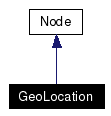
| Home | Hierarchy | Members | Alphabetical | Related Pages |
#include <geolocation.h>
Inherits Node.
Inheritance diagram for GeoLocation:

Public Member Functions | |
| GeoLocation (const char *name="") | |
| virtual | ~GeoLocation () |
| virtual unsigned int | nbFields () const |
| virtual FieldHandle | field (const std::string &n) |
| virtual FieldHandle | field (const unsigned int i) |
| virtual bool | isSetToDefaultValue (const unsigned int i) const |
| virtual unsigned int | nbEventsIn () const |
| virtual EventInHandle | eventIn (const std::string &n) |
| virtual EventInHandle | eventIn (const unsigned int i) |
| virtual unsigned int | nbEventsOut () const |
| virtual EventOutHandle | eventOut (const std::string &n) |
| virtual EventOutHandle | eventOut (const unsigned int i) |
| const char * | typeName () const |
| virtual Node * | duplicate () const |
| virtual Node * | duplicate (std::map< const Node *, Node * > &) const |
Public Attributes | |
Exposed Fields | |
A field that is capable of receiving events via an eventIn to change its value(s), and generating events via an eventOut when its value(s) change. | |
| SFString | geoCoords |
Fields | |
A property or attribute of a node. Each node type has a fixed set of fields. Fields may contain various kinds of data and one or many values. Each field has a default value. | |
| MFNode | children |
| SFNode | geoOrigin |
| MFString | geoSystem |
Events In | |
| EventIn< SFString > | set_geoCoords |
Events Out | |
| EventOut< SFString > | geoCoords_changed |
The GeoLocation node provides the ability to georeference any standard VRML model. That is, to take an ordinary VRML model, contained within the children field of the node, and to specify its location on the surface of the planet. This node is a grouping node that can be thought of as a Transform node. However, the GeoLocation node specifies an absolute location, not a relative one, so content developers should not nest GeoLocation nodes within each other.
The geoOrigin field is used to specify a local coordinate frame for extended precision as described in 4.15.5 Dealing with high-precision coordinates.
The geoSystem field is used to define the spatial reference frame and is described in 4.15.3, Encoding a spatial reference frame.
The geometry of the nodes in children is to be specified in units of metres in VRML coordinates relative to the location specified by the geoCoords field. The geoCoords field should be given in the format described in 4.15.4, Encoding geospatial coordinates.
The set_geoCoords eventIn can be used to dynamically update the location of a model (for example, via the output of a GeoPositionInterpolator.
In addition to placing a VRML model at the correct location on the planet, the GeoLocation node will also adjust the model's orientation appropriately. The standard VRML97 coordinate system specifies that the +Y axis = up, +Z = out of the screen, and +X = towards the right. The GeoLocation node will set the orientation so that, for the location specified, the +Y axis is the up direction for that local area (the normal to the tangent plane on the ellipsoid), -Z points towards the north pole, and +X is east.
Note that the children field of GeoLocation is not an exposedField and therefore the nodes specified cannot be changed at run-time. In order to support dynamically changing geometry, a Group node can be added as the top-level node and then the contents of that Group node can be modified through its children exposedField.
![]()
|
|
Construct a node with all its fields set to default value, which is equivalent to the code below: geoCoords = string(""); |
|
|
Virtual destructor, does nothing |
|
|
Implements Node. |
|
|
Returns a deep copy of this node, that is a fully independant node with all children (if any) also copied. This is mainly useful for instanciating protos. Implements Node. |
|
|
Return a handle on the Implements Node. |
|
|
Return a handle on the event in named
Implements Node. |
|
|
Return a handle on the
Implements Node. |
|
|
Return a handle on the event out named
Implements Node. |
|
|
Return a handle on the
Implements Node. |
|
|
Return a handle on the field named
Implements Node. |
|
|
Implements Node. |
|
|
Returns the number of events in for this node type. Implements Node. |
|
|
Returns the number of events out for this node type. Implements Node. |
|
|
Returns the number of fields (exposed or not) for this node type. Implements Node. |
|
|
Returns Implements Node. |
|
|
See Detailed Description for meaning of this field. Default value is set to MFNode default value |
|
|
See Detailed Description for meaning of this field. Default value is set to geoCoords = string(""); |
|
|
Changed event associated to exposedField geoCoords |
|
|
See Detailed Description for meaning of this field. Default value is set to SFNode default value |
|
|
See Detailed Description for meaning of this field. Default value is set to |
|
|
Set event associated to exposedField geoCoords |
Generated on 24 Feb 2005 with
 version 1.3.9.1.
version 1.3.9.1.
|
|